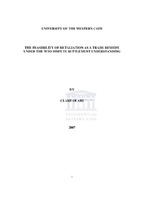| dc.contributor.advisor | Wandrag, Riekie | |
| dc.contributor.author | Olaki, Clare | |
| dc.contributor.other | | |
| dc.contributor.other | Faculty of Law | |
| dc.date.accessioned | 2013-09-27T09:00:35Z | |
| dc.date.available | 2008/06/19 10:25 | |
| dc.date.available | 2008/06/19 | |
| dc.date.available | 2013-09-27T09:00:35Z | |
| dc.date.issued | 2007 | |
| dc.identifier.uri | http://hdl.handle.net/11394/2156 | |
| dc.description | Magister Legum - LLM | en_US |
| dc.description.abstract | The main aim of the research was to determine the viability of retaliation as a trade remedy under the Dispute Settlement Understanding. It was to establish whether retaliation as a remedy is beneficial to the entire WTO membership and system. The specific objectives were: to examine the feasibility of damages as an alternative remedy to retaliation; to determine whether there is a need to revise the Dispute Settlement Understanding, for it to adopt a more development friendly approach to dispute resolution; to make recommendations regarding the improvement of the Dispute Settlement Understanding. | en_US |
| dc.language.iso | en | en_US |
| dc.publisher | University of the Western Cape | en_US |
| dc.subject | Foreign trade regulation | en_US |
| dc.subject | International trade | en_US |
| dc.subject | Dispute resolution (Law) | en_US |
| dc.title | The feasibility of retaliation as a trade remedy under the WTO Dispute Settlement Understanding | en_US |
| dc.type | Thesis | en_US |
| dc.rights.holder | University of the Western Cape | en_US |
| dc.description.country | South Africa | |

